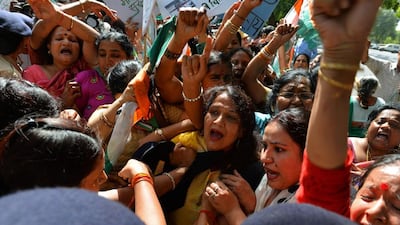NEW DELHI // A forensic inquiry into two teenage girls found hanged in Uttar Pradesh has ruled out sexual assault, casting doubt on the statements of the girls’ families that they were raped.
The examination, conducted by the Centre for DNA Fingerprinting and Diagnostics (CDFD) last month, found no traces of male DNA on the victims’ clothes.
Similarly, no female DNA was found on the clothes of the five men accused of raping and then hanging the girls, aged 14 and 15, from a mango tree on May 28.
The father of the younger of the two victims – whose names cannot be published under Indian privacy laws – told The National on Friday that the families had told the truth.
The gruesome death of the girls, cousins living in the village of Katra Sadatganj in Uttar Pradesh, shocked the nation with its overtones of caste violence.
The forensic inquiry contradicts the postmortem examinations carried out just days after the hanging, which found that the girls had been raped.
The Central Bureau of Investigation (CBI), which took over the case in June following a national uproar, had wanted to exhume the bodies of the two girls for a second postmortem last month. But heavy rains had submerged the riverbank where they were buried, making the exhumation impossible.
The CDFD inquiry, the results of which were revealed two days ago, was commissioned because the exhumation was ruled out. The clothing samples of the victims as well as the accused had been retained as evidence after the crime.
Since May, the five accused – all from the Yadav caste, which is considered higher than the girls’ Maurya caste – have passed lie-detector tests, even as relatives of the girls have failed polygraph tests.
Lie-detector tests are not admissible in Indian courts.
As a result, media reports have begun to speculate that the girls were murdered in a case of “honour killing”, a practice by which families or village councils order young men and women to be killed for supposedly bringing shame or disrepute to the clan.
Dhakar Singh, a Katra Sadatganj resident who works for a local NGO and knows the families of the victims, said he had doubts about the honour-killing theory.
“The families appear to be much too upset at the deaths of their daughters for them to have done something like that,” Mr Singh said. “They’re threatening to commit suicide themselves now, and they’re claiming that the Yadavs are being protected by the government.”
But the latest forensic investigation have unsettled his beliefs about the case.
“Now, I don’t know what’s true and what’s not,” Mr Singh said.
S R Darapuri, a retired Uttar Pradesh police inspector general, said he was not surprised the CBI’s investigation contradicted the police postmortem.
The state’s police force, he said, was severely strapped for resources and easily manipulated by political pressure. The pressure to quickly confirm that the victims had been raped may have distorted the findings of the police postmortem.
“In general, the police’s response to such crimes is very poor,” Mr Darapuri said. “They don’t visit the scene of the crime promptly. As a result, evidence is often lost or overlooked.”
ssubramanian@thenational.ae

